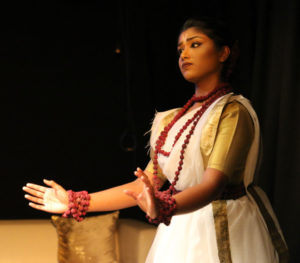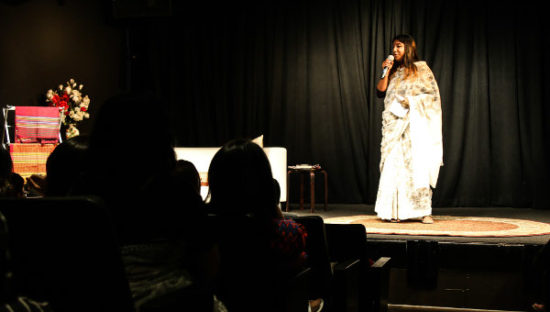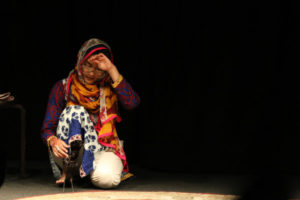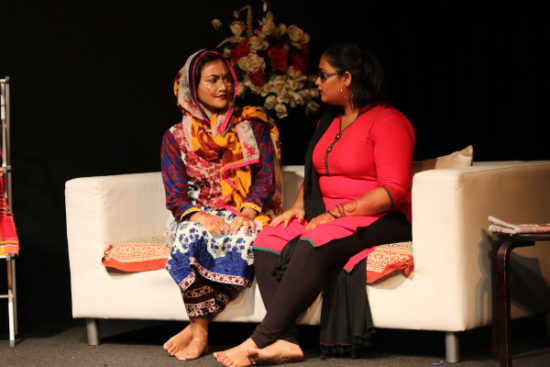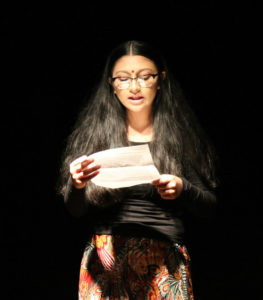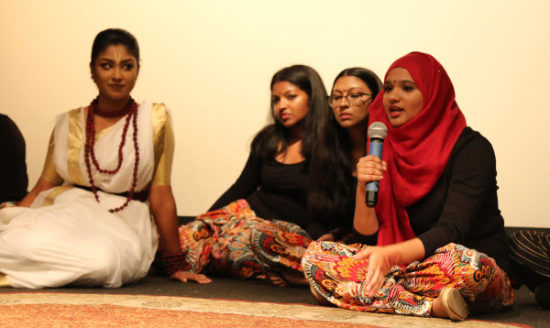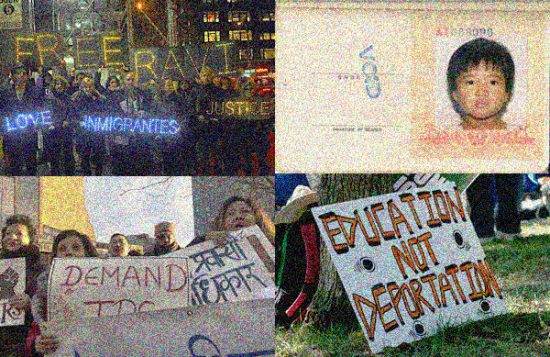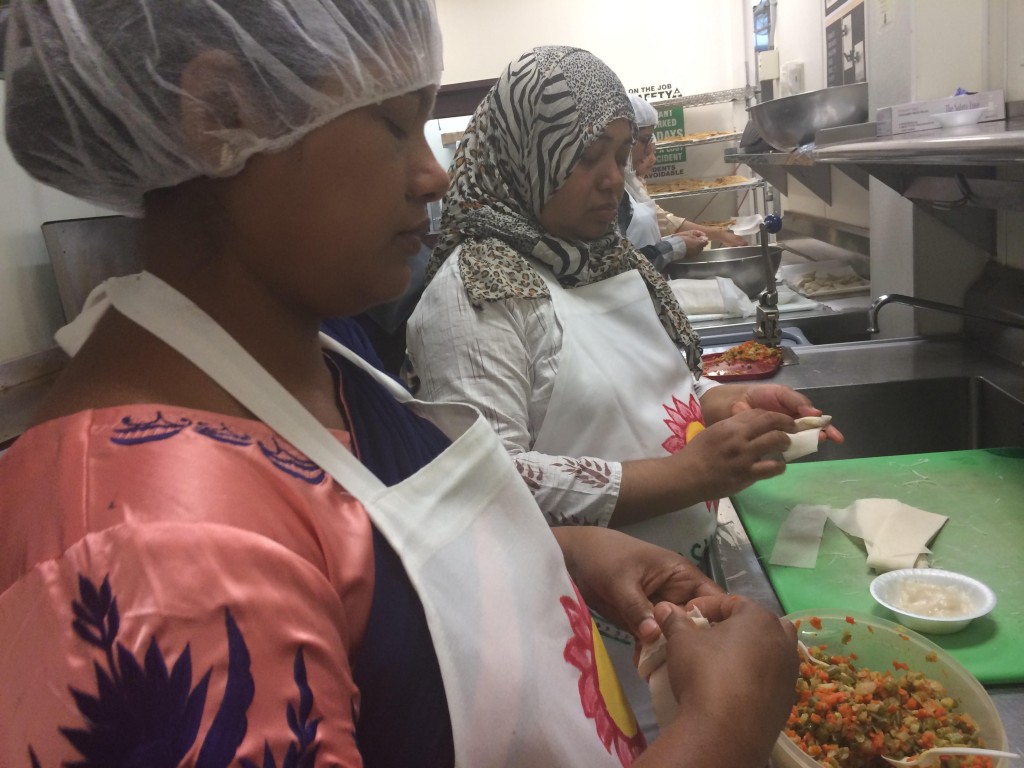Young Bangladeshi theater troupe uses traditional folk theater to confront trauma in the community.
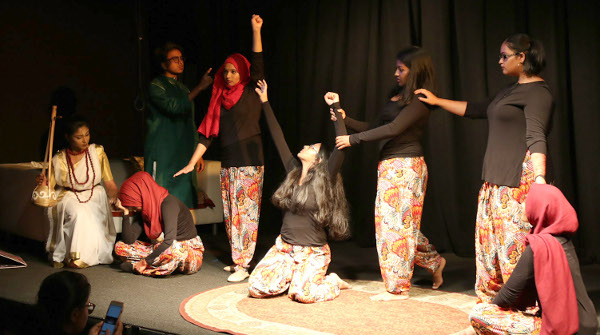
October 13, 2016
Tabla beats reverberated through the walls of a recording studio in Bed-Stuy as a group of young Bangladeshi women sing in harmony: “Oh Mukti Re (Oh My Freedom)”. Not only that this is their first time professionally recording a song, it’s also their first time singing.
“Ki je hoyse
Abar hoyse
Meyder chara hobe na
(Whatever just happened,
Can happen again
It can never change without women)
Cholo shobai
Shunen Shunen
Mohila der kobita
(Come together,
Listen, listen
Words from wise women)”
They nail it.
The six young women – the Bangladeshi Historical Memory Project’s jatra troup – emerge out of the cramped recording booth. It wasn’t until the previous day that the troupe even had lyrics for the song that was created in collaboration with Saraswathi Jones, a South Asian Boston-based artist known for her “postcolonial pop rock” style.
They were able to weave together music that incorporated the complicated relationship between family and politics within the Bangladeshi diaspora as they remembered stories from the play.
Not long after recording their first song, the young women made their acting debut in Naree Bidrohi or Women’s Uprising: Stories of Bangladeshi Resilience, where the song will be the title track. The show is not a typical play or musical either.
Jatras are a form of folk theater that is popular among Bengali speaking parts of South Asia, including Bangladesh and the cities of Kolkata, Bihar, Assam, and others. The word ‘jatra’ translates to journey; performance troupes travel throughout South Asia taking communities on a journey through popular stories and music. Naree Bidrohi is a political theater project that invokes the courageous spirit of jatras.
“In the greater New York area, Bangladeshi troupes are hard to come by, especially an all-women troupe like the Bangladeshi Historical Memory Project, which seeks to shed light on domestic violence, mental health, Islamophobia and entrapment,” said Sharmin Hossain, founder of the Bangladeshi Historical Memory Project or BHMP, as well as the director and producer of the jatra.
BHMP also functions as an archive of historical and contemporary media documenting the narratives of resilience from Bangladeshi people.
For Sharmin, one of the motivations for doing the BHMP project was to have those uncomfortable conversations that are often silenced due to the lack of resources in the Bangladeshi community. She explained that the jatra, which is BHMP’s biggest project to date, aims to utilize political theater to disrupt the silence surrounding the lack of institutional support in Bangladeshi communities. For instance, the need for more culturally sensitive social programs that address issues like mental health and domestic violence.
These themes are evident throughout the scenes of the jatra, which is based on the lives of Bangladeshi activists and communities across the diaspora. Stories from the troupe members helped inspire the script, and the young women performers were invited to share the ways their lives have been shaped by the issues that impact their families.
A central component of the jatra is the story of Shifa Sadeqee, who was arrested by the FBI on terrorism charges while returning to the U.S. from Bangladesh in 2005. One of the jatra’s troupe members, Khadija Rahman, is cast as Sadeqee’s sister, who fought resiliently demanding the U.S. government reverse the falsified charges. Upon hearing the news of the jatra, Shifa’s sister, Sadeqee, wrote to the troupe members from prison thanking them for bringing attention to his story and consequences of post-9/11 entrapment.
“Reading letters from incarcerated Muslim men in solitary confinement made all of these feel just so real,” said Khadija, 15, who also joined Desis Rising Up and Moving (DRUM) as a youth leader last summer. “It was hard to grasp how something like this could happen to someone because I didn’t know anyone personally. It made me really proud to be in the jatra.”
Khadija describes how tears rolled down her eyes as she read Shifa’s experience with the United States government, and how it helped her understand the gravity of post-9/11 surveillance policies.
The jatra is remarkable in the way it is able to open dialogues about current sources of trauma, while serving as a way for the young troupe of second-generation Bangladeshis to connect with the history of their motherland.
“Bangladeshi history is never taught in our schools,” Safia Chowdhury, 17, who played the role of Mithila, a community leader organizing the response to Shifa’s case. Safia was passionate about bringing these stories to the public: “We [in the Bangladeshi community] often try to stay away from the conversations that make us question our own beliefs but we need to have them.”
The troupe took to Diversity Plaza in Jackson Heights to act out a scene from the jatra as a preview to their sold-out performances at the Helen Mills Theater. The troupe decided to use Diversity Plaza as a platform for forum theater, inspired by traditional jatra performances in open-air stages and techniques from the Theater of the Oppressed.
The performance, which was free and open to the public, functioned as a platform for the Bangladeshi community to open a dialogue about the issues that affect them. Over 400 residents of Jackson Heights showed up for the troupe’s debut at Diversity Plaza under the scorching hot sun. The troupe performed a scene about domestic violence for the primarily Bangladeshi audience. After the performance, audience members were invited to change the script and create an alternative solution for the issues highlighted in the jatra.
The scene opened with Mithu criticizing his daughters Shamsun and Farida, for talking about boys instead of studying or looking for jobs. Mithu eventually shifted the blame onto his wife, Murshida, claiming that she raised them the wrong way. The argument escalated, and Mithu slapped Murshida across the face. End of scene.
Sharmin, who also played the emcee of the forum, invited the audience members to change the scene. The only catch is that no one is allowed to play the role of Mithu. Sharmin explained that to eliminate the position of an oppressor would be idealistic, and far from the reality of the oppressed.
“We cannot pretend that oppression in our communities do not exist,” Sharmin says to the audience in Bangla. “I’m not going to imagine that I live in a world where people like Mithu do not exist. Violence is a problem in our community and we need to have a rehearsal for when it happens in real life, so we are prepared for intervention.”
Watch a video about the Bangladeshi Historical Memory Project
According to data collected by the American Bar Association, two in five South Asian immigrant women in the U.S. are survivors of domestic violence (this number only accounts for reported incidents). But despite the knowing looks and nods in the audience as Sharmin spoke, many hesitated to volunteer and change the scene. For many people, being invited on stage was a new dynamic.
Eventually, a participant takes Sharmin up on her invitation to the stage and changes the scene so that Mithu is challenged to change his violent behavior. The role of the abuser remains constant, while collectively brainstorming the ways the community can intervene and disrupt violence. This approach helps bystanders understand their roles in preventing violence and protecting their community.
The forum theater at Diversity Plaza was the most honest public dialogue that troupe members have had with the larger Bangladeshi community.
For Anika, who plays Murshida, the jatra helped facilitate and create language to talk about domestic violence with her parents. After she told her dad that the jatra was about domestic violence, he shrugged it off as something that doesn’t happen in their community. But her mom fired back and told him that it does happen but only women talk about it because they are the victims.
“That was the first time we had a conversation about domestic violence in my family and I feel like the jatra can do that in every family,” Anika says.

